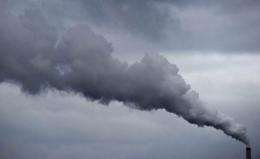CO2 storage law falls through in Germany

Germany's parliament Friday blocked a law allowing the storage of carbon dioxide underground, as Europe's top economy wrangles over energy policy following Japan's nuclear disaster.
The Bundesrat upper house, where Chancellor Angela Merkel's conservative coalition no longer holds a majority, voted down the plans for pilot projects of carbon capture and storage (CCS) ahead of a viability assessment in 2017.
The government must now come up with a revised bill to conform with a directive from the European Union on the technology.
CCS aims to snare CO2 as it is pumped out from fossil-fuel burning plants, liquefy it and bury it underground, usually in disused natural gas storage chambers, to stop it escaping into the atmosphere and causing climate change.
It is seen as a way of buying time for politicians to forge an effective treaty on greenhouse gases and wean the global economy off cheap but dirty fossil fuels.
But critics say CCS could be dangerous and that the large amount of investment needed would be better spent on renewable sources of energy, such as solar and wind power, or on nuclear power.
Energy company Vattenfall, the only firm in Germany planning to build CCS plants for the pilot projects, criticised the vote, saying it needed certainty to go ahead with the plans.
"It's one minute before midnight," said the firm's boss in Germany, Tuomo Hatakka.
The Bundesrat, where Germany's 16 states are represented, expressed concerns about safety and were not placated by a clause giving them the say on where the storage sites are located.
Environmental pressure groups Greenpeace and BUND called on Germany to scrap the CCS project altogether.
In June, Germany decided to get rid of nuclear power by 2022, a decision set in motion in the wake of the Fukushima disaster in Japan.
The move to pull the plug on the country's 17 reactors marked a stark about-face by Merkel and her centre-right government which last year had approved plans to extend their operation.
The seven oldest reactors were already switched off after Japan's massive March 11 earthquake and tsunami knocked out cooling systems at the Fukushima Daiichi plant, causing reactors to overheat and radiation to leak.
Germany's nine reactors currently on line are due to be turned off between 2015 and 2022, becoming the first major industrialised power to agree an end to atomic power since the disaster, the world's worst since Chernobyl in 1986.
(c) 2011 AFP





















